

Ronald Reagan’s wartime lies: The president had quite a Brian Williams problem. When it emerged that NBC News anchor Brian Williams had misled the public for years with a harrowing account of coming under enemy fire on a military helicopter during the 2003 invasion of Iraq, observers were quick to draw comparisons with other public figures caught telling tall tales about combat experiences.

Some hearkened back to Hillary Clinton’s bogus 2008 assertion that she had landed “under sniper fire” during a trip to Bosnia a dozen years earlier; in reality, video from the trip showed a smiling Clinton and her daughter walking calmly on the tarmac, with no sign of trouble whatsoever. There’s another figure who merits mention in this discussion, one whose serial blurring of lines between fiction and reality was a mainstay of his public career. That figure, of course, was Ronald Reagan. Reagan’s fibs were manifold. Once in office, Reagan’s deception in the Iran-Contra scandal briefly threatened his presidency.
In the story, which J. Colbert Hits the Right for Revisionist History on St. Ronnie. The Social Significance of Zombies - Newsweek and The Daily Beast. How To Love The Zombie Apocalypse : 13.7: Cosmos And Culture. Hide captionWorld War Z is just the latest pop-culture incarnation of the Zombie Apocalypse.
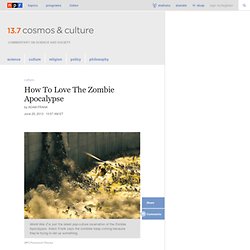
Adam Frank says the zombies keep coming because they're trying to tell us something. MPC/Paramount Pictures World War Z is just the latest pop-culture incarnation of the Zombie Apocalypse. Adam Frank says the zombies keep coming because they're trying to tell us something. "Zombie Apocalypse? It was our weekly astronomy group lunch when everyone, from the professors down to the undergrads, gets together for pizza. 11 Legendary Monsters of Africa. The human body is an amazing thing.
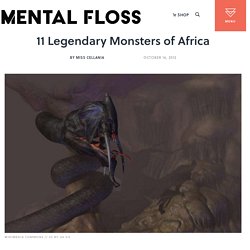
For each one of us, it's the most intimate object we know. And yet most of us don't know enough about it: its features, functions, quirks, and mysteries. Our series The Body explores human anatomy, part by part. Think of it as a mini digital encyclopedia with a dose of wow. If it weren't for our immune system, none of us would live very long. Here are 12 fighting facts about the immune system. Modern Mythology and the Transmedia Revolution. In Search of Myth and Meaning...
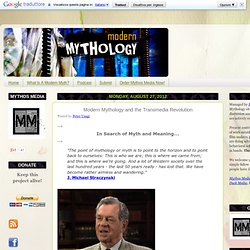
"The point of mythology or myth is to point to the horizon and to point back to ourselves: This is who we are; this is where we came from; and this is where we're going. And a lot of Western society over the last hundred years - the last 50 years really - has lost that. We have become rather aimless and wandering. " The Power of Myth was one of the most popular TV series in the history of public television. In a series of six hour-long episodes, American mythologist Joseph Campbell peeled back the layers of mystery that had once shrouded our species ancient storytelling traditions. Campbell blew away the accumulated funk of centuries of traditional academic inquiry, and connected the dots between mythic traditions that had once been separated by hundreds of miles, and thousands of years. Finding Joe “Nothing will see us through the age we're entering but high consciousness, and that comes hard. Follow Your Bliss - Joseph Campbell from Christoph on Vimeo.
The power of myths. The myths surrounding Saint Olaf’s death may not be 100 per cent historically correct.
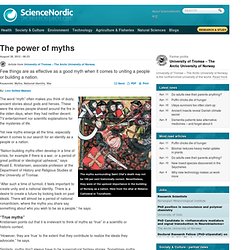
Nevertheless, they were of the upmost importance in the building of Norway as a nation. Here from the altar at Nidaros Cathedral in Trondheim. The word “myth” often makes you think of dusty, ancient stories about gods and heroes. These were the stories people shared around the fire in the olden days, when they had neither decent TV entertainment nor scientific explanations for the mysteries of life. Yet new myths emerge all the time, especially when it comes to our search for an identity as a people or a nation.
“Nation-building myths often develop in a time of crisis, for example if there is a war, or a period of great political or ideological upheaval,” says Roald E. “After such a time of turmoil, it feels important to create unity and a national identity. “True myths” Kristiansen points out that it is irrelevant to think of myths as “true” in a scientific or historic context. The Singularity is Near-Sighted: Joseph Campbell's Vision for the Internet Age. Beams and Struts employs commenting guidelines that we expect all readers to bear in mind when commenting at the site.
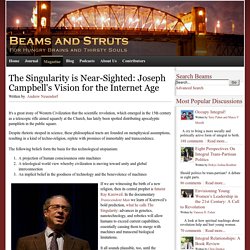
Please take a moment to read them before posting - Comment Link Tuesday, 13 December 2011 16:36 posted by Jeremy Johnson Hi Andrew, As a fellow student of Campbell and mythology at large, I thoroughly enjoyed this. You're an excellent writer. I was extra-excited to leap to the comment section before even reading this thoroughly, because I've been studying this very subject all semester at grad school.
I've read a couple of semi-geeky books and articles about cyborgs, AI, the global brain and Kelly's "technium. "